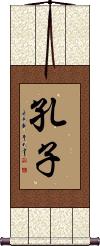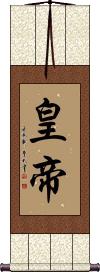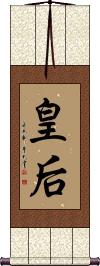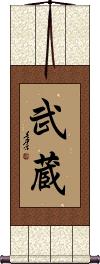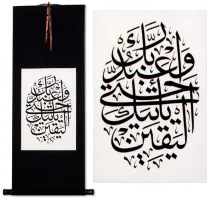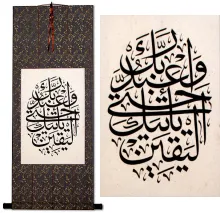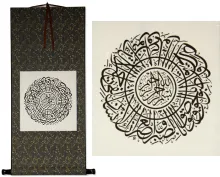Many custom options...
And formats...

Until Death in Chinese / Japanese...
Buy an Until Death calligraphy wall scroll here!
Personalize your custom “Until Death” project by clicking the button next to your favorite “Until Death” title below...
Confucius
孔子 is how to write the name of the great sage, known in the West as Confucius.
His real name is Kongzi (The name Confucius is a westernized version of his name - his family name is Kong, and “zi” was added as a title of distinction).
He lived some 2500 years ago in Qufu, a town in modern-day Shandong Province of Northern China (about 6 hours south of Beijing by bus). He was a consort to Emperors, and after his death, the impact of his philosophies still served to advise emperors, officials, and common people for generations.
Also during these thousands of years, the Kong family remained powerful in China, and the Kong estate was much like the Vatican in Rome. The Kong estate existed as if on sovereign ground with its own small garrison of guards and the privileges of a kingdom within an empire.
This was true up until the time the Kong family had to flee to Taiwan in 1949 when the Red Army took victory over the Nationalists during the Revolution. The home of Confucius was later razed and all statues were defaced or stolen during the Cultural Revolution. Finally, after years of smearing his name and image, it is once again okay to celebrate the teachings of Confucius in mainland China.
Known as Khổng Tử in Vietnamese.
Emperor
皇帝 means emperor in Chinese, Japanese, and old Korean.
From times of old, the emperors of Asia ruled under the authority of God himself. One definition of an emperor is a ruler put in power by God. This definition separates emperors from the various kings in Chinese history (although defining who is a king versus an emperor gets vague sometimes).
Occasionally, the emperor's wife was widowed, and she took the role of an empress until her death (see our entry for empress if that is what you are looking for).
Empress
皇后 is the title of empress/emperess, the female form of the emperor.
皇后 is used in Chinese, Japanese Kanji, and old Korean Hanja.
While the emperor's reign was for life, if he died, his wife would hold his power. In this case, a woman was the ultimate ruler of the greater part of East Asia (now China) until her death and the succession of the emperor's firstborn son to lead the empire. Numerous times in various Chinese dynasties, an empress took power in this way.
The first character means emperor by itself.
The second character alone can mean “wife of an emperor or king” (the first character clarifies that we are talking about an empress and not a queen). It can also mean sovereign or last offspring, depending on context.
Note: In some books, this word is translated as queen. While only incorrect if you get technical (because an empress is theoretically a higher level than a queen), the meaning is very similar.
皇后 is sometimes used for the title of queen, but more technically, this is the wife of the emperor (a higher level than a queen).
Musashi
The most famous Samurai
Miyamoto Musashi is probably the most famous Samurai in all of Japanese history.
武蔵 is the short title for a man long in legend. While coming from a lower class, his new sword and fighting techniques put him on par with the best that feudal Japan had to offer. His long career started with his first duel at age 13!
He is credited with using two swords at once and never losing a single battle in his career. After becoming a Buddhist, and getting older, like many old warriors, he took up a peaceful and solitary life until his death around 1645 A.D.
Note: Technically, Musashi is his given name, and Miyamoto is his surname. However, it's suggested that he assumed both of these names and had a few other names in childhood, as well as being given a Buddhist name. It's hard to know what to call him, as with most Kanji, there are multiple pronunciations. The characters for Musashi can also be pronounced Takezō. But everyone in modern times seems to know him by the name Musashi.
The White Hairs of Old Age
Until death do us part
This in-stock artwork might be what you are looking for, and ships right away...
Gallery Price: $85.00
Your Price: $46.88
Not the results for until death that you were looking for?
Below are some entries from our dictionary that may match your until death search...
| Characters If shown, 2nd row is Simp. Chinese |
Pronunciation Romanization |
Simple Dictionary Definition |
白頭偕老 白头偕老 see styles |
bái tóu xié lǎo bai2 tou2 xie2 lao3 pai t`ou hsieh lao pai tou hsieh lao |
More info & calligraphy: The White Hairs of Old Age |
不空 see styles |
bù kōng bu4 kong1 pu k`ung pu kung fukuu / fuku ふくう |
(given name, person) Fukuu Amogha, Amoghavajra. 不空三藏; 智藏; 阿目佉跋折羅 Not empty (or not in vain) vajra. The famous head of the Yogācāra school in China. A Singhalese of northern brahmanic descent, having lost his father, he came at the age of 15 with his uncle to 東海, the eastern sea, or China, where in 718 he became a disciple of 金剛智 Vajrabodhi. After the latter's death in 732, and at his wish, Eliot says in 741, he went to India and Ceylon in search of esoteric or tantric writings, and returned in 746, when he baptized the emperor Xuan Tsung. He was especially noted for rain-making and stilling storms. In 749 he received permission to return home, but was stopped by imperial orders when in the south of China. In ?756 under Su Tsung he was recalled to the capital. His time until 771 was spent translating and editing tantric books in 120 volumes, and the Yogacara 密教 rose to its peak of prosperity. He died greatly honoured at 70 years of age, in 774, the twelfth year of Tai Tsung, the third emperor under whom he had served. The festival of feeding the hungry spirits 孟蘭勝會 is attributed to him. His titles of 智藏 and 不空三藏 are Thesaurus of Wisdom and Amogha Tripitaka. |
波濕縛 波湿缚 see styles |
bō shī fú bo1 shi1 fu2 po shih fu Hashibaku |
(波栗濕縛); 波奢 pārśva, the ribs. Pārśva, the tenth patriarch, previously a Brahman of Gandhāra, who took a vow not to lie down until he had mastered the meaning of the Tripiṭaka, cut off all desire in the realms of sense, form and non-form, and obtained the six supernatural powers and eight pāramitās. This he accomplished after three years. His death is put at 36 B. C. His name is tr. as 脇尊者 his Worship of the Ribs. |
死而後已 死而后已 see styles |
sǐ ér hòu yǐ si3 er2 hou4 yi3 ssu erh hou i |
until death puts an end (idiom); one's whole life; unto one's dying day |
白頭到老 白头到老 see styles |
bái tóu dào lǎo bai2 tou2 dao4 lao3 pai t`ou tao lao pai tou tao lao |
(to live together until the) white hairs of old age (idiom); to live to a ripe old age in conjugal bliss; until death do us part |
骨を埋める see styles |
honeouzumeru / honeozumeru ほねをうずめる |
(exp,v1) to die in (a foreign land); to engage in something until death comes; to do something for the rest of one's life |
Variations: |
soitogeru そいとげる |
(v1,vi) (1) to remain married for life; to live as a married couple until death; (v1,vi) (2) to succeed in marrying |
The following table may be helpful for those studying Chinese or Japanese...
| Title | Characters | Romaji (Romanized Japanese) | Various forms of Romanized Chinese | |
| Confucius | 孔子 | koushi / koshi | kǒng zǐ / kong3 zi3 / kong zi / kongzi | k`ung tzu / kungtzu / kung tzu |
| Emperor | 皇帝 | koutei / kotei | huáng dì / huang2 di4 / huang di / huangdi | huang ti / huangti |
| Empress | 皇后 | kou gou / kougou / ko go | huáng hòu huang2 hou4 huang hou huanghou | |
| Musashi | 武蔵 | mu sashi / musashi | ||
| The White Hairs of Old Age | 白頭偕老 白头偕老 | bái tóu xié lǎo bai2 tou2 xie2 lao3 bai tou xie lao baitouxielao | pai t`ou hsieh lao paitouhsiehlao pai tou hsieh lao |
|
| In some entries above you will see that characters have different versions above and below a line. In these cases, the characters above the line are Traditional Chinese, while the ones below are Simplified Chinese. | ||||
Successful Chinese Character and Japanese Kanji calligraphy searches within the last few hours...
